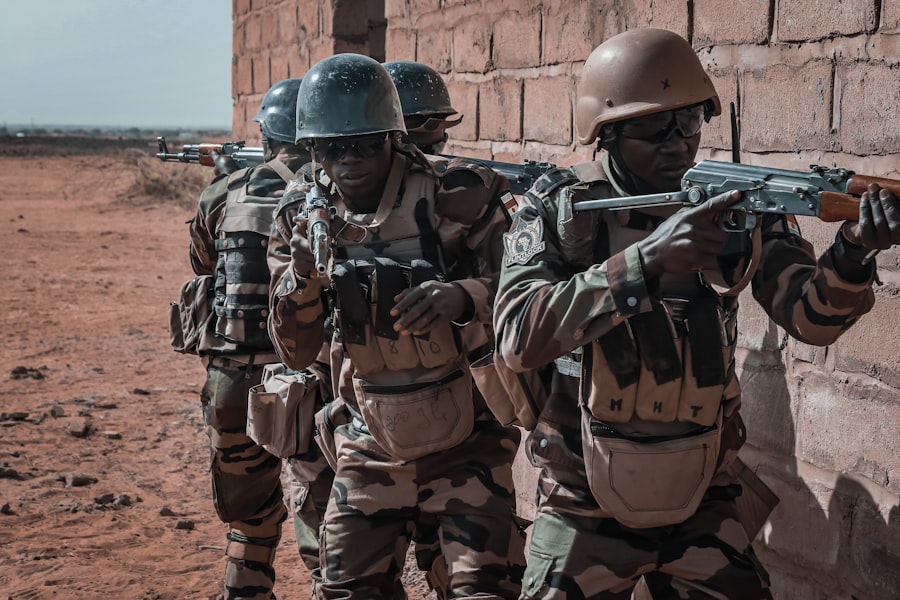The landscape of global security has evolved significantly over the past few decades, leading to the emergence of various entities tasked with maintaining peace and order in conflict-ridden regions. Among these, United Nations (UN) peacekeeping forces stand out as a prominent international effort aimed at stabilizing volatile situations and fostering conditions for lasting peace.
These missions are often deployed in response to requests from member states or the UN Security Council, with the goal of facilitating political processes, protecting civilians, and supporting the implementation of peace agreements. In contrast, private military companies (PMCs) have emerged as a controversial alternative in the realm of security provision. These entities operate on a for-profit basis, offering a range of services that include armed security, logistical support, and training for military personnel.
The rise of PMCs has sparked intense debate regarding their role in modern conflicts, particularly concerning issues of accountability, legality, and ethical implications. While both UN peacekeeping forces and PMCs aim to address security challenges, their approaches, mandates, and operational frameworks differ significantly, raising important questions about their respective effectiveness and legitimacy in the complex arena of international relations.
Key Takeaways
- UN peacekeeping operates under international mandates with a focus on maintaining peace and security, while private military companies pursue profit-driven objectives.
- Legal frameworks and accountability mechanisms differ significantly, with UN missions subject to international law and private militaries often operating in legal gray areas.
- Funding for UN peacekeeping comes primarily from member states, whereas private military firms are funded by contracts from governments or corporations.
- Ethical concerns arise regarding the use of private military forces, including issues of transparency, human rights, and the potential for abuse.
- Future trends suggest increasing reliance on private military companies alongside UN missions, raising questions about effectiveness, oversight, and global security implications.
Historical Background of UN Peacekeeping and Private Military
The origins of UN peacekeeping can be traced back to the early 1940s, when the devastation of World War II underscored the need for a robust international mechanism to prevent future conflicts. The first official UN peacekeeping mission was established in 1948 in the Middle East, tasked with monitoring a ceasefire between Israel and its Arab neighbors. Over the decades, the scope and scale of UN peacekeeping operations expanded dramatically, responding to a diverse array of conflicts across Africa, Asia, Europe, and the Americas.
These missions have evolved from traditional inter-state conflicts to more complex intra-state wars characterized by ethnic tensions and humanitarian crises. On the other hand, private military companies began to gain prominence in the late 20th century, particularly following the end of the Cold War. The dissolution of state-controlled military structures in various regions created a vacuum that PMCs sought to fill.
Initially, these companies provided logistical support and training; however, their roles quickly expanded to include direct combat operations. The Gulf War in the early 1990s marked a turning point for PMCs, as they were employed by both governments and corporations to secure interests in conflict zones. This shift raised critical questions about sovereignty, legality, and the ethical implications of outsourcing military functions to private entities.
Differences in Mandate and Objectives of UN Peacekeeping and Private Military
The mandates of UN peacekeeping forces are rooted in principles established by the United Nations Charter. These missions are designed to maintain peace and security while promoting human rights and facilitating political dialogue among conflicting parties. UN peacekeepers operate under strict guidelines that emphasize impartiality and neutrality, often working alongside local authorities and civil society organizations to foster reconciliation and stability.
Their primary objective is to create an environment conducive to sustainable peace, which may involve disarming combatants, protecting civilians, and supporting humanitarian efforts. In stark contrast, private military companies operate with profit as their primary motive. Their objectives are often dictated by contractual agreements with clients—be they governments or corporations—rather than a commitment to international law or humanitarian principles.
PMCs may engage in direct combat operations or provide security services tailored to specific client needs, which can lead to a focus on short-term gains rather than long-term stability. This divergence in objectives raises significant concerns about the potential for PMCs to exacerbate conflicts or prioritize profit over humanitarian considerations.
Legal Framework and Accountability in UN Peacekeeping and Private Military
| Aspect | Description | Key Metrics | Challenges | Accountability Mechanisms |
|---|---|---|---|---|
| Legal Framework | International laws and UN regulations governing peacekeeping operations and private military companies (PMCs) |
|
|
|
| Accountability in UN Peacekeeping | Mechanisms to ensure peacekeepers adhere to legal and ethical standards |
|
|
|
| Accountability in Private Military Companies | Regulation and oversight of PMCs operating in conflict zones |
|
|
|
The legal framework governing UN peacekeeping operations is grounded in international law and the principles of the United Nations Charter. Peacekeepers are typically granted immunity from prosecution under host country laws; however, they remain accountable to their home countries and the UN itself. The UN has established mechanisms for investigating allegations of misconduct by peacekeepers, including sexual exploitation and abuse.
Despite these frameworks, accountability remains a contentious issue, as many victims face significant barriers in seeking justice. Conversely, private military companies operate in a legal gray area that complicates accountability. While some countries have enacted regulations governing PMCs, there is no comprehensive international legal framework that uniformly addresses their operations.
This lack of oversight can lead to instances of human rights abuses without adequate recourse for victims. Furthermore, the contractual nature of PMC engagements often obscures accountability, as companies may evade responsibility by citing their clients’ directives or operational parameters. This disparity in legal frameworks raises critical questions about the effectiveness of oversight mechanisms for both UN peacekeepers and PMCs.
Funding and Resources for UN Peacekeeping and Private Military
UN peacekeeping missions are funded through contributions from member states based on an agreed-upon scale that considers each country’s economic capacity. This collective funding model allows for a pooling of resources to support diverse missions across the globe. However, financial constraints often hinder the effectiveness of these operations.
Delays in funding can lead to shortages in personnel, equipment, and logistical support, ultimately impacting mission outcomes. Additionally, political considerations can influence funding decisions, with some member states withholding contributions based on disagreements with specific missions or broader geopolitical dynamics. In contrast, private military companies rely on contracts with governments or corporations for their funding.
This profit-driven model allows PMCs to mobilize resources quickly and efficiently; however, it also raises concerns about prioritizing profit over ethical considerations. The competitive nature of the PMC industry can lead to cost-cutting measures that compromise operational standards or safety protocols. Furthermore, reliance on private funding can create conflicts of interest where corporate objectives may overshadow humanitarian imperatives.
Effectiveness and Success Rates of UN Peacekeeping and Private Military

Evaluating the effectiveness of UN peacekeeping missions is complex due to the multifaceted nature of conflicts they engage with. While some missions have successfully facilitated political transitions and reduced violence—such as those in Namibia and Mozambique—others have faced significant challenges that hindered their success. Factors such as inadequate resources, lack of political will from member states, and complex local dynamics can impede mission effectiveness.
Moreover, measuring success is often subjective; what constitutes success for one stakeholder may differ significantly for another. Private military companies have also faced scrutiny regarding their effectiveness in conflict zones. While they can provide rapid response capabilities and specialized skills that traditional military forces may lack, their involvement has not always led to positive outcomes.
Instances where PMCs have been implicated in human rights abuses or have failed to achieve strategic objectives raise questions about their long-term impact on stability. The lack of transparency surrounding PMC operations further complicates assessments of their effectiveness compared to more established entities like UN peacekeeping forces.
Ethical and Moral Considerations in UN Peacekeeping and Private Military
The ethical implications surrounding UN peacekeeping missions are deeply intertwined with their foundational principles of neutrality and impartiality. Peacekeepers are expected to uphold human rights standards while navigating complex political landscapes that may challenge their moral compass. Instances of misconduct by peacekeepers have sparked outrage and calls for reform within the UN system.
Critics argue that without robust accountability mechanisms, the potential for exploitation or abuse remains high, undermining the very principles that guide these missions. Private military companies face even more pronounced ethical dilemmas due to their profit-driven nature. The commodification of security raises questions about the morality of outsourcing military functions to private entities motivated by financial gain rather than humanitarian concerns.
Reports of PMCs engaging in violent actions without adequate oversight highlight the potential for ethical breaches that can exacerbate conflicts rather than resolve them. The challenge lies in reconciling the need for security with ethical considerations that prioritize human rights and dignity.
Challenges and Limitations Faced by UN Peacekeeping and Private Military
Both UN peacekeeping forces and private military companies encounter significant challenges that limit their effectiveness in conflict zones. For UN missions, challenges include political complexities within host countries, insufficient troop contributions from member states, and difficulties in securing safe operating environments for personnel. Additionally, peacekeepers often operate under restrictive mandates that may hinder their ability to respond effectively to emerging threats or protect vulnerable populations.
Private military companies also face unique challenges related to operational legitimacy and public perception. The controversial nature of their involvement in conflicts can lead to backlash from local populations or international communities who view them as mercenaries rather than legitimate security providers. Furthermore, PMCs must navigate complex legal landscapes that vary by country; this can complicate their operations and expose them to legal risks that traditional military forces may not face.
Case Studies: UN Peacekeeping Missions vs Private Military Operations
Examining specific case studies provides valuable insights into the contrasting roles played by UN peacekeeping forces and private military companies in conflict situations.
The mission’s emphasis on collaboration with local communities and adherence to international norms contributed significantly to its success.
In contrast, the involvement of private military contractors during the Iraq War illustrates the complexities surrounding PMC operations. Companies like Blackwater gained notoriety for their aggressive tactics and involvement in high-profile incidents that raised ethical concerns about accountability and civilian safety. The contrasting outcomes of these case studies highlight how different operational frameworks can lead to varying degrees of success or failure in achieving stability.
Public Perception and Media Coverage of UN Peacekeeping and Private Military
Public perception plays a crucial role in shaping attitudes toward both UN peacekeeping missions and private military companies. Media coverage often influences how these entities are viewed by global audiences; positive portrayals of successful peacekeeping efforts can enhance support for future missions, while negative reports about misconduct can undermine public trust in international institutions. Private military companies frequently face more polarized perceptions due to their controversial nature.
Media narratives surrounding PMCs often focus on incidents involving violence or human rights abuses, leading to widespread skepticism about their role in conflict resolution. This dichotomy underscores the importance of transparent communication strategies for both UN peacekeepers and PMCs as they navigate public scrutiny.
Future Trends and Implications for UN Peacekeeping and Private Military
As global security dynamics continue to evolve, both UN peacekeeping forces and private military companies will need to adapt to new challenges and opportunities. The increasing complexity of conflicts—characterized by hybrid warfare tactics and non-state actors—may necessitate innovative approaches from both entities. For UN missions, this could involve greater collaboration with regional organizations or enhanced training programs focused on addressing emerging threats.
For private military companies, there may be a growing demand for transparency and accountability as public awareness regarding ethical considerations increases. Stakeholders may push for stricter regulations governing PMC operations to ensure compliance with international law while addressing concerns about human rights abuses. In conclusion, while both UN peacekeeping forces and private military companies play significant roles in addressing global security challenges, their differing mandates, operational frameworks, and ethical considerations highlight important distinctions between them.
As they navigate an increasingly complex landscape marked by evolving threats and public scrutiny, understanding these differences will be crucial for policymakers seeking effective solutions for maintaining peace and stability worldwide.
The debate surrounding UN peacekeeping forces versus private military contractors has gained significant attention in recent years, particularly as the complexities of modern conflicts evolve. A related article that delves into these issues can be found on In The War Room, which explores the implications of relying on private military firms in conflict zones. For more insights, you can read the article [here](https://www.inthewarroom.com/).
WATCH THIS! The Secret War for Africa’s Gold: How Private Armies Fund Global Conflict
FAQs
What is UN peacekeeping?
UN peacekeeping refers to the deployment of international personnel, including military, police, and civilian staff, by the United Nations to help maintain or restore peace and security in conflict areas. These missions are authorized by the UN Security Council and operate under a mandate to support political processes, protect civilians, and assist in disarmament and rebuilding efforts.
What are private military companies (PMCs)?
Private military companies are private organizations that provide military services, including armed security, training, logistics, and combat support, to governments, corporations, or other clients. Unlike UN peacekeepers, PMCs operate for profit and are not directly controlled by international organizations or states.
How do UN peacekeepers differ from private military contractors?
UN peacekeepers are deployed under international mandates with a focus on neutrality, protection of civilians, and supporting peace processes. They operate under strict rules of engagement and international law. Private military contractors, on the other hand, are hired by clients for specific tasks, often with a profit motive, and may operate under different legal frameworks and less transparency.
Are UN peacekeepers armed?
Yes, UN peacekeepers are typically armed for self-defense and to protect civilians under threat. However, their use of force is generally limited and governed by the mission’s mandate and international law, emphasizing restraint and impartiality.
Can private military companies engage in combat operations?
Yes, private military companies can be contracted to provide combat support and security services, including armed protection and offensive operations, depending on their contract terms and the legal environment in which they operate.
What legal frameworks govern UN peacekeeping forces?
UN peacekeeping operations are governed by international law, including the UN Charter, international humanitarian law, and the specific mandates issued by the UN Security Council. Peacekeepers are expected to adhere to strict codes of conduct and rules of engagement.
Are private military companies regulated internationally?
Regulation of private military companies varies by country and is less standardized internationally. Some international efforts, such as the Montreux Document and the International Code of Conduct for Private Security Providers, seek to establish guidelines, but enforcement remains inconsistent.
What are the main objectives of UN peacekeeping missions?
The main objectives include maintaining ceasefires, protecting civilians, supporting the implementation of peace agreements, assisting in disarmament and reintegration of combatants, and helping to establish stable governance and rule of law.
Why might a country choose to hire private military contractors instead of relying on UN peacekeepers?
Countries or organizations may hire private military contractors for greater flexibility, rapid deployment, specialized skills, or to avoid political constraints associated with UN mandates. PMCs can operate under commercial contracts and may provide services not covered by peacekeeping missions.
What are some criticisms of private military companies?
Criticisms include concerns about accountability, transparency, potential human rights abuses, profit motives conflicting with ethical considerations, and the risk of undermining state sovereignty or international law.




